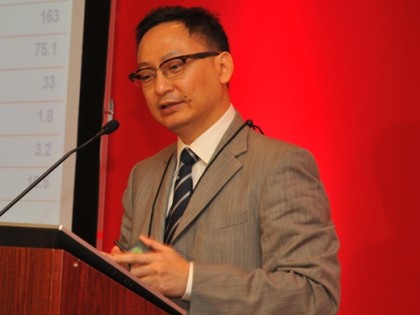
Eastern promise
Clement Cheung, postmaster general of Hongkong Post, spoke with Mail & Express Review editor John Modd about his organisation and its business strategies. We started by clarifying some facts and figures about Hongkong Post.
Clement explained that the Post “provides uninterrupted service to 2.89m residential and business addresses in Hong Kong through a team of 7,400 staff, a network of 127 post offices (including two mobile ones) and a fleet of 280 vehicles”.
Some 1.38bn items of mail (3.78m per day) were handled in 2008/09, of which 86.2% was local mail and 13.8% international. This represented a volume drop of 2.1% compared with the year before.
Hongkong Post had total revenues of HK$4,556m in 2008/09, a growth of 4.2% compared to the previous year, and driven mainly by international mail. Operating profit was HK$349m, yielding a rate of return of 9.9% on average net fixed assets.
I asked about the Universal Service Obligation and the regulatory environment in Hong Kong.
“Our corporate mission is to meet both local needs and international obligations by providing reliable and efficient postal services at reasonable and affordable prices. We do so by arranging daily mail delivery, Monday to Saturday, to residential and business addresses throughout the territory as well as to personal post boxes located in our premises,” Clement responded.
Since Hongkong Post is a government department, it comes under the policy purview of the Commerce and Economic Development Bureau. There are no immediate plans to go down the privatisation route although there are ongoing discussions on how to enhance the long term financial viability of postal operations.
There has been no liberalisation of the general letters market. “Section 6 of Chapter 98 of the Post Office Ordinance stipulates that collection and delivery of letters is an exclusive privilege of the Postmaster General.”
We next discussed the future of the letters business and the challenges and opportunities it faces.
Clement Cheung is clear that “the rising popularity of the internet is already an irreversible phenomenon. Apart from e-statements and e-payments, the advent of social networking applications is changing personal habits and posing a serious threat to our letters business. As a result, about 80% of our local mail is transactional, of which 20% or so is related to direct marketing or unaddressed mail.”
To cope with this reality Hongkong Post has launched its Circular Service. This allows merchants to reach out to prospective customers within a geographical area, defined to the level of streets and buildings, and complemented by sophisticated target segmentation tools.
“We are also seeking collaboration with the China Post Group on a cross border direct mail service to leverage the increasing integration of the Pearl River Delta Region and a booming outbound tourism industry. Projects of this nature will generate a stable and sustainable volume of mail traffic” the Postmaster General added.
There are also some interesting plans for a ‘Mail-on-Demand’ service focused on SMEs and e-traders. As well as typical hybrid mail functionality such as printing, folding, enveloping and stamping, other capabilities include an on-line stationery and postage calculator, and market intelligence and direct marketing tools.
The parcels market in Hong Kong is very much open to competition. I asked Clement Cheung how effectively Hongkong Post competes with the global operators. We also talked more about e-commerce initiatives.
“The market environment in Hong Kong is fiercely competitive and unforgiving. Major international couriers have made great strides to upgrade their conveyance capacity, network coverage and software systems. The global financial crisis that erupted in 2008 also prompted them to expand into products and services catering for small and medium sized firms which are the staple customers of Hongkong Post” was how Clement set the scene.
He outlined a three pronged response.
“To begin with, e-traders specialising in low value goods cannot afford the premium services of the international couriers. We have exploited this niche by pioneering next day delivery at affordable prices to cities in China, Japan, South Korea, Singapore and Vietnam. We have also set up a communications platform with e-traders for information dissemination, experience sharing, customer education and product design/testing.
“Furthermore, a postal network spanning across over one hundred territories has a distinct competitive edge when it comes to global parcel delivery, especially given the rapid emergence of developing nations where transport and logistics infrastructures might not be too efficient. To this end, we joined five other posts (United States, China, Japan, Australia and South Korea) to form the Kahala Posts Groups to spur mutual cooperation in express mail services. This alliance has since been expanded to include France, United Kingdom, Spain and Singapore.”
The other third key initiative is the development of the post’s on-line portal.
“ShopThruPost is spearheading our campaign to gain presence in cyberspace. Evolving from a venue for the purchase of stamps and philatelic products, it has become a virtual arcade featuring electronic gadgets, audiovisual equipment, health products and fashionable accessories” Clement told me.
“Most of our existing services are geared towards the physical communications market such as letter/parcel delivery, customer service support, order fulfillment, inventory management and warehousing, address database management etc. But as Hongkong Post ventures into e-commerce by using its on line shopping portal, we will keep an open mind on opportunities to create synergy with the wider communications market.”
The vision is for an integrated e -commerce solution that embraces promotion, sales, order fulfillment and logistics, and payment.
Moving on to Hongkong Post’s retail network, the Postmaster General outlined his plans to expand the product portfolio.
“Set against the urbanised cityscape in Hong Kong, our network of 127 post offices represents a powerful backbone that has not been fully utilised. Some retail services such as bill payment and e-remittance have been introduced but more needs to be done to mitigate the inevitable downturn of the letters business. Although we have to live within the confines of the legal framework that governs the scope of activities capable of being pursued by Hongkong Post, further attempts are being made to expand our range of services.”
A pilot project is in progress to revamp the design layout and mix of facilities provided in two post offices with a view to enhancing their appeal to bulk mailers and e-traders. Discussion is also underway with several banks on the installation of automatic teller machines and the provision of a common electronic payment gateway. “Going forward, we will look into the feasibility of engaging in agencies services for financial institutions and setting up physical outlets for our on line shopping portal.”
Clement Cheung had already referred to collaboration in the Pearl River Delta. This prompted me to ask him about relationships with mainland China and what other opportunities there were for leveraging the links.
“Hong Kong is an integral part of China but enjoys a high degree of autonomy except in the areas of defence and foreign relations” he explained. “For this reason, Hongkong Post participates in events and activities organised by the Universal Postal Union as part of the delegation led by the State Post Bureau. Nonetheless, we maintain a separate postal regime with cross border mail traffic subject to payment of terminal dues in the usual manner.”
Clement believes that “geographical proximity and cultural affiliation place us in an ideal position to nurture a mutually beneficial relationship with the China Post Group”.
In express mail services six initiatives have been rolled out in the past three years. These include “Next Morning Delivery” and “Next Day Delivery” services that ensure timely delivery of important items, “Postage-paid-by-addressee” and “Cash-on-Delivery” services that confer payment assurance, as well as Economy Express and EC-Post services that strike a balance between cost and speed of delivery.
There are other examples of working together: “In e-commerce our gift fulfillment service brings the hearts of friends and relatives closer together during festive seasons such as the Lunar New Year and the Mid-Autumn Festival. In logistics we provide local delivery and warehousing support for brand names with a manufacturing base in South China such as Dell Computers. Finally, concerted efforts are being made to roll out the cross border direct marketing service to major cities in the Mainland.”
Clement Cheung is proud of Hongkong Post’s position as a trusted service provider with high levels of customer satisfaction.
“Having been in existence for 169 years, Hongkong Post is a household brand and an icon of service quality and professional ethics. Our achievement is built upon an impeccable track record in achieving our performance pledges, a set of transparent yardsticks accessible by the general public and reviewed every year, and upon our ability to meet our social obligations whilst striving to open up alternative revenue streams.”
In a study based on over 10,000 interviews, carried out by a local university between June and August last year, and which covered 68 major providers of goods and services, postal services ranked highest in terms of consumer satisfaction in the latter category. The post’s own annual survey recorded a customer satisfaction level of over 93% for hotline, counter and delivery services.
In conclusion, I asked what the top priorities were for Hongkong Post going forward.
“Our attention will be focused on the implementation of projects in the pipeline aimed at speeding up business transformation, the refinement of existing initiatives to consolidate the contribution gained from alternative revenue streams, and the continued exercise of vigilance in budgetary control” Clement told me.
“In e-commerce, we will not lose any impetus in enriching the range of products available on ShopThruPost through intensifying our linkage with other postal administrations and our interface with fledging retailers. We will also assess the merits of bundling storage, order fulfillment and marketing support for smaller firms.”
In the letters business “we will perfect the Hongkong Post Circular Service by developing additional utilities and we will extend the cross border direct mail service to more cities in the Mainland. For our retail premises, we will expedite the discussion on automatic teller machines, a common payment gateway and agency services. Regarding express mail services, we will uplift the performance standard of Speedpost through the Kahala Post Group and bilateral cooperation with selected territories.”
Although relatively new to his role, I was left with a very clear impression that Clement Cheung has an in-depth appreciation of what needs to be done to maintain Hongkong Post’s viability in an ever more challenging business environment.
Biography
Clement Cheung joined the Hong Kong Civil Service as an Administrative Officer in 1983 and was assigned to a variety of positions involved with the formulation and execution of government policies concerning hospital services, housing, multilateral trade, investment promotion, public works and financial services regulation.
Recent appointments included Director of the Economic and Trade Office in Singapore from 1998 to 2001 with responsibility for ASEAN affairs, at a time when the region was seriously hit by the Asian financial turmoil. Between 2001 and 2006 he was Deputy Secretary of the former Works Bureau which included management of an HK$29bn public works programme; and from 2006 to 2009 Mr Cheung oversaw the prudential regulation of all authorised insurers, again during a tumultuous period.
This article was published in September 2010’s Mail & Express Review. To subscribe to the industry’s leading quarterly publication, please click here.











